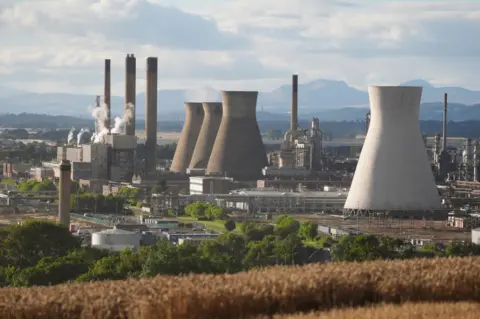 PA Media
PA MediaSir Keir Starmer has announced a further £200m investment in the Grangemouth site.
The prime minister called the announcement an “investment in Scotland’s industrial future” when he addressed Scottish Labour’s conference in Glasgow. The money will go towards creating a new industrial purpose for the site.
The oil refinery, owned by Petroineos, is set to close by the summer with the loss of more than 400 jobs.
Scotland’s first minister, John Swinney, announced £25m of new funding in a statement to Holyrood last week and called for the UK government to invest more in the site.
Petroineos announced the refinery at the central Scotland facility would close and transition to become an import terminal after reporting massive losses last year.
Redundancy letters were sent out to staff at the refinery earlier this month, with just 65 of 500 jobs expected to be retained.
Approximately 2,000 people are directly employed at the site – 500 at the refinery, 450 on the Forties pipeline from the North Sea and a further 1,000 in the Ineos petrochemicals business.
A £1.5m report into the feasibility of Grangemouth becoming a low-carbon energy hub, known as Project Willow, is due to be published by the end of the month.
Addressing the party’s Scottish conference, Sir Keir said oil and gas would be part of Scotland’s future for decades to come to protect the country’s energy security.
But he said the UK had to be at the forefront of clean energy and that the Grangemouth site presented a “huge opportunity for renewal”.
He said the site could have a future in bioengineering, biofuels, or Hydrogen energy.
He told the conference: “We will grasp the opportunities at Grangemouth, work alongside partners to develop viable proposals, team up with business to get new industries off the ground.
“And to attract private investors into the partnership we need, we will allocate £200m from the National Wealth Fund, for investment in Grangemouth, investment in Scotland’s industrial future.
“That is the difference a Labour government can make.”
The PM added that working people had to be protected, and that every worker made redundant would get 18 months full pay.
He said there would be a £10m skills and training offer backed by the UK government and any businesses within the Grangemouth Freeport area that takes on the refinery workers would get national insurance relief.
Sir Keir said a £100m growth deal was already in place for the area, supported by both the Scottish and UK governments.
The Scottish Labour leader Anas Sarwar told the BBC’s Sunday Show the investment would pave the way for a “clean and secure energy future”.
Sarwar previously admitted there had been “nowhere near enough progress” on efforts to support workers.
However, he said his party was “determined to deliver a just transition”.
He said: “We were promised the ‘Saudi Arabia of renewables’ by the SNP government, we were promised a transition by a previous Tory government that was going to be fair.
“But it has not felt fair when you looked at what is happening in Grangemouth and this is a demonstration that this UK Labour government and a Scottish Labour government too, post 2026, will be absolutely determined to deliver a genuine just transition.”
He added: “That means thousands more jobs, billions of pounds worth of inward investment and the clean energy future, and security that our country needs.”
What is the National Wealth Fund?
The £200m investment will come from the National Wealth Fund.
The fund is publicly-owned and backed by the Treasury, and invests alongside the private sector in projects across the UK – primarily focusing on initiatives that support clean energy.
The UK government said its aim was to direct “tens of billions of pounds” of private investment to decarbonise the British economy.
An initial £5.8bn injection was earmarked for green projects including “carbon capture, green hydrogen, ports, gigafactories and green steel,” according to UK government documents.
 PA Media
PA MediaOn Tuesday, Scotland’s first minister said his government would commit £25m to establish a “just transition” fund for Grangemouth.
This money would expedite any proposals which come from Project Willow, which is examining other industries which could exist on the site such as plastics recycling, hydrogen production and sustainable aviation fuel.
John Swinney said the additional £25m would take the Scottish government’s total investment for the site to £87m.
He also urged the UK government to at least match the Scottish government’s just transition fund.
The first minister said on Tuesday: “We need the UK government to do at least the same and deliver a fair amount to avoid significant economic disruption in central Scotland, and to protect and promote Scotland and Grangemouth’s future interests.
“In short, we need this Labour government to do what it said it would do before the election.”
BBC Scotland News has approached the Scottish government for comment on the £200m funding announcement.
‘Devil in the detail’
Unite is the sole union representing workers at the plant.
It has led a campaign for the refinery to be transitioned into a production hub for sustainable aviation fuel (SAF).
The union said the funding was a “step in the right direction,” but warned the “devil would be in the detail”.
General secretary Sharon Graham said the deal was “welcome news” but stressed it was only the start of securing the facility for future generations.
She said: “This needs to be the start not the end in delivering a real workers’ transition for Grangemouth.
“It is essential that all stakeholders come together to put the meat on the bones and that this investment counts for jobs and our security. Clear timescales will be important as well as details on jobs.”
Roz Foyer, general secretary of the Scottish Trades Union Congress (STUC), said securing the jobs and futures of the workforce “must be the priority”.
She added: “This announcement cannot be dismissed lightly. However, this funding will only have a transformative impact if used correctly and is accompanied by even further investment from both governments.”




